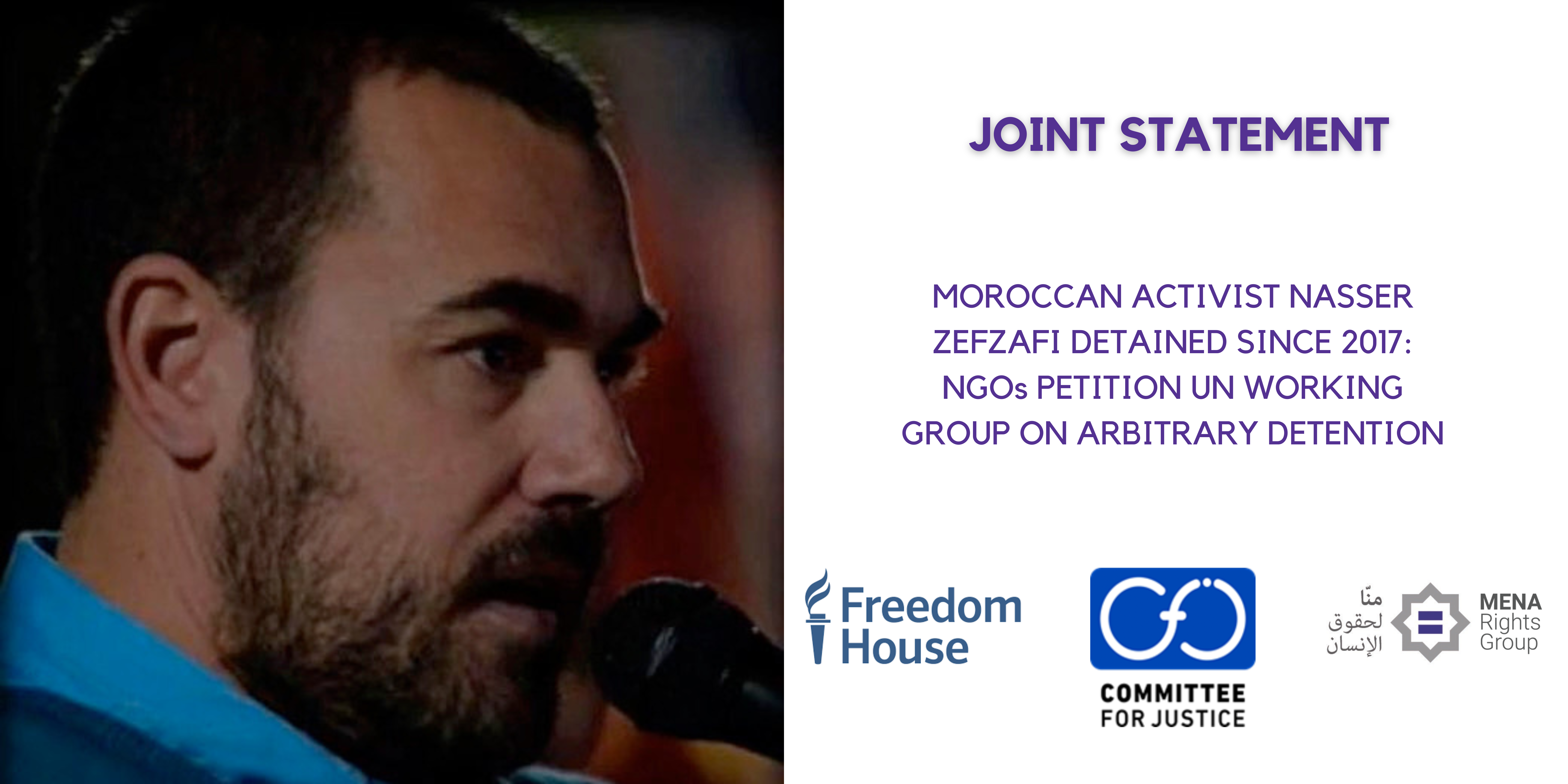April 03, 2024

Washington, DC and Geneva, Switzerland – Committee for Justice, Freedom House, and MENA Rights Group have jointly petitioned the United Nations Working Group on Arbitrary Detention (WGAD) on behalf of Nasser Zefzafi, an imprisoned political activist in Morocco. Zefzafi is serving an unjust 20-year prison sentence for his peaceful activism on behalf of his indigenous Amazigh community in the marginalized Rif region.
As the end of Ramandan, Eid al-Fitr, approaches, the organizations jointly appeal to the Moroccan government to unconditionally release Nasser Zefzafi. During this important holiday and as Morocco has presidency of the United Nations Human Rights Council in Geneva, it is more important now than ever for the country to uphold respect for human rights and the rule of law.
Zefzafi was a prominent leader of the 2016 Hirak el-Rif movement, which was triggered by the brutal death of a local fishmonger in al-Hoceima who was crushed by a rubbish truck as he tried to recover fish unfairly confiscated by the authorities. It was the country’s largest series of public demonstrations since 2011, gathering tens of thousands of people. Zefzafi and other Hirak leaders expressed socioeconomic demands that received national and international attention, and transcended class divisions.
Zefzafi was arrested on May 29, 2017 before being held in prolonged solitary confinement for nearly a year. In June 2018, the Casablanca Court of Appeal sentenced in first instance Zefzafi to 20 years in prison and his co-defendants to sentences ranging from one year to 20, for allegedly attacking police forces and in some cases burning vehicles and a police building. On April 6, 2019, their sentence was confirmed on appeal, largely based on statements that the defendants said were made under police torture.
“The guarantees of a fair trial were not respected throughout the procedures, thereby rendering his conviction unlawful under the standards of international law” stated MENA Rights Group. The NGO also believes that Zefzafi’s deprivation of liberty results from the exercise of his rights to freedom of expression and peaceful assembly and association.
In a 2018 letter to the European Parliament as one of the Sakharov Prize finalists that year, Zefzafi displayed a lasting commitment to nonviolence and justice in the face of a litany of abuses committed against his community. In his own words, he aims to “one day awaken in a … world [without weapons],” with its people living “in peace on this beautiful blue planet.”
“The right to peaceful assembly is of fundamental importance to the functioning of a democratic and people-centered society,” said Committee for Justice “Over the past decade in Morocco, however, administrative delays and arbitrary restrictions on obtaining authorization from the Ministry of Interior to “protest publicly” have been on the rise. The crackdown against Zefzafi and the Hirak el-Rif movement is a clear demonstration of such a regrettable trend.”
Zefzafi’s leadership was crucial to the Hirak el-Rif movement despite his imprisonment. In 2017 a video leaked by a website affiliated with Moroccan security forces showed Zefzafi detained, with bruises and other marks on his body suggesting physical abuse. This video sparked a new eruption of protests in several cities—within and outside of the Rif—calling for his release.
Zefzafi’s case is emblematic of the current wave of repression and human rights abuses in Morocco. Zefzafi and many other activists in the country have been mercilessly prosecuted, imprisoned, and tortured. Notably, multiple journalists have been surveilled, threatened, and jailed for any reporting that could be perceived as critical of King Mohammed VI or the security services. In November 2022, Mohammed Ziane, an 80-year-old veteran lawyer who represented Zefzafi, was arrested and sent to prison, in apparent retaliation for his human rights work.
According to sources close to him, Zefzafi’s health continues to deteriorate in prison as authorities prevent him from receiving sufficient medical treatment. “As he continues to endure terrible treatment into the sixth year of his long sentence, we join our partners in calling for Zefzafi’s immediate and unconditional release,” said Margaux Ewen, director of Freedom House’s Fred Hiatt Program to Free Political Prisoners.
The Kingdom of Morocco nominally holds regular multiparty elections for parliament and local bodies, and reforms in 2011 shifted some governmental authority from the monarchy to the national legislature, but the king and his palace officials maintain full authority through a combination of substantial formal powers and informal lines of influence in the state and society. Many civil liberties are constrained in practice. In Freedom House’s Freedom in the World 2023 report, Morocco is classified as Partly Free, with an overall score of 37 out of 100. For political rights, Morocco has a score of 13 out of 40, and for civil liberties, it has a score of 24 out of 60.
Committee for Justice seeks justice for victims of human rights violations in Egypt, the Middle East, and North Africa, through raising awareness of the current situation, and supporting human rights stakeholders to contribute to enhance the Judicial system and helping victims.
Freedom House is a nonprofit, nonpartisan organization that works to create a world where all are free. We inform the world about threats to freedom, mobilize global action, and support democracy’s defenders.
MENA Rights Group is a Geneva-based legal advocacy NGO defending and promoting fundamental rights and freedoms in the Middle East and North Africa region.






